City to ask for resident input on budget ahead of multi-million dollar 2019 deficit
Alison Albelda/The Daily Northwestern
Former 5th Ward alderman Delores Holmes and equity and empowerment coordinator Patricia Efiom attend a Thursday Equity and Empowerment Commission meeting. Members discussed plans for resident input before city staff draft the fiscal year 2019 budget.
April 27, 2018
As Evanston anticipates another multi-million dollar budget deficit in the next calendar year, city staff plans to gather resident input on programs and services ahead of drafting the fiscal year 2019 budget later this year.
Speaking at an Equity and Empowerment Commission meeting Thursday, assistant city manager Erika Storlie said the city will encourage residents to fill out a survey about certain programs and services and provide feedback about their needs. The list — which contains roughly 150 separate programs — was compiled in the past six weeks.
Storlie said the staff examined all the services Evanston provides and — after running them through a “matrix” to determine their cost, use and effectiveness — determined which programs rank in the bottom third. She said many of these services must “either be right-sized or phased out” in the upcoming budget cycle “because we don’t have the funding to adequately provide them anymore.”
Typically, budgeting discussions start in late summer, and the final budget is voted on at the end of the calendar year — which is also the end of the city’s fiscal year. This year, however, Storlie said preliminary budget talks began in February, “pretty much after the ink was dry on the previous budget.”
She said the early start was deliberate and meant to ensure residents all across Evanston get a say in what programs are important to them. The city wants to “put an equity lens on the budget,” she said, and work actively to combat the estimated $3 million to $5 million deficit.
Equity and empowerment coordinator Patricia Efiom told The Daily that the city had asked for similar resident input on its budget back in 2012, but not in recent years. Following last year’s deficit, she said, this year, they wanted to ensure that they “engage the community and do it in an equitable way.”
Former 5th Ward alderman Delores Holmes, who is a member of the commission, said residents first talked about priority-based budgeting at a ward meeting on April 20, where they were asked to rank a small list of city programs on a scale from one to four based on how well they helped achieve City Council goals.
Ald. Robin Rue Simmons (5th) said at last week’s meeting that City Council has “some tough decisions to make … We have over a hundred areas that we need to address.”
“Everyone has a different values system and different priorities, so I don’t think there’s going to be any easy way to do it, but we all have to start the process and work toward a solution that is best for all of our city,” she said.
On Thursday, Efiom and other commission members stressed the importance of reaching out to residents who will be most affected by potential cuts to services. She said demographic data will be collected from all residents who fill out the survey — whether online or in various locations across the city — and allow staff to tailor the final decisions to residents’ needs.
Storlie said once the city collects data from residents, they will present it to City Council, who will use it in budget discussions toward the end of the year.
Holmes said looking at the budget process through an equity lens “is not an easy task.”
“It’s going to be interesting to watch the process and how people take into consideration other people and their needs,” she said.
Email: [email protected]
Twitter: @kristinakarisch


